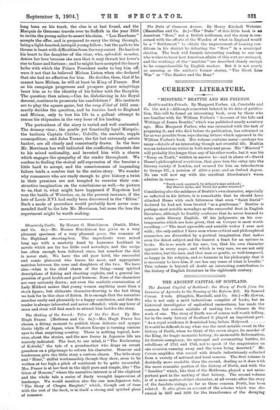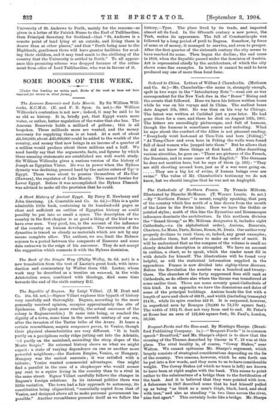THE ANCIENT CAPITAL OF SCOTLAND.
The Ancient Capital of Scotland : the Story of Perth from the Invasion of Agricola to the Passing of the Reform Bill. By Samuel Cowan. 2 vols. (Simpkin, Marshall, and Co. 30s.)—Mr. Cowan, who is not only a most industrious compiler of books, but an historical investigator of undoubted earnestness, has made the common but serious mistake of making two volumes do the work of one. The story of Perth was of course well worth telling,
for in the early history of Scotland it played an important part
"As a royal residence it flourished long before Holyrood It would be difficult to say what was the most notable event in the history of Perth, when we think of the seven sieges, its murder of the King, its tragic monastic history, its memorable Reformation, its Gowns conspiracy, its episcopal and covenanting battles, its rebellions of 1715 and 1745, not to speak of the magistrates on one occasion running away and the town being deserted." Mr. Cowan amplifies this record with details industriously collected from a variety of national and local sources. The first volume is decidedly more readable than the second, dealing as it does with the more romantic portion of the history of Perth, and with the "families" which, like that of the Methvens, played a not unim- portant part in the making of that history. The second volume is of a more matter-of-fact character, at all events after the story of the Jacobite risings, so far as these concern Perth, has been related. It also gives an account of the scheme which was dis- cussed in 1697 and 1698 for the transference of the decaying University of St. Andrews to Perth, mainly for the reasons—as given in a letter of Sir Patrick Hume to the Earl of Tullibardine, then Principal Secretary for Scotland—that "St. Andrews is a remote point of land lying at an outside, and living there is dearer than at other places," and that "Perth being near to the Highlands, gentlemen there will have greater facilities for sead- ing their children, and it may tend much to the civilising of the country that the University is settled in Perth." To all appear- ance this promising scheme was dropped because of the retire- ment from office of Lord Tnllibardine, who was in favour of it.







































 Previous page
Previous page